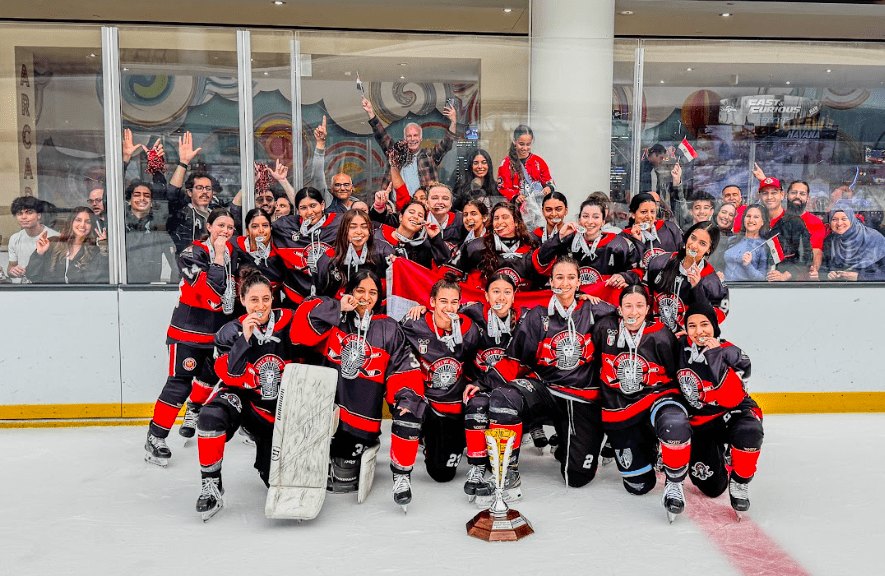
During the inaugural NWHL season, one of the feel-good stories belongs to New York Riveters goaltender Nana Fujimoto. Having stood between the pipes for Japan at the 2014 Sochi Winter Games, the event helped increase attentiveness to her potential as an elite world-class goaltender.
As her efforts with the New York Riveters have proven to be a coming out party, she has simultaneously embodied the great spirit of competitiveness in the NWHL, a league dedicated to helping provide opportunities for international players. Among Fujimoto’s teammates with the Riveters, she plays alongside Austria’s Janine Weber, the first player to have signed an NWHL contract, and Russia’s Lyudmila Belyakova, who also competed at Sochi 2014.
A compelling figure that also competed in the NWHL’s first-ever game on October 11, 2015, Fujimoto would become part of a watershed moment for women’s professional hockey. It was part of an eventful 2015 for Fujimoto, which saw her win the Directorate Award as the Best Goaltender at the 2015 IIHF Women’s World Championships in Malmo, Sweden. Not only would her 1.52 GAA pace all goaltenders at the event, her .937 save percentage ranked second only to Florence Schelling.
Despite allowing the first goal in NWHL history, scored by Connecticut Whale skater Jessica Koizumi, it was a unique way to be immortalized. Credited with the first loss in league history, as Canadian-born goaltender Jaimie Leonoff grabbed the victory in a landmark game, Fujimoto worked tirelessly to keep her team competitive in the contest, finishing with a solid 26-save effort.
Eventually recording her first victory, the career milestone also represented a proud moment in franchise history as Fujimoto was between the pipes for the first win in Riveters history. Such a result was only enhanced by Fujimoto’s remarkable performance, only adding to her growing legend.
Competing against the Boston Pride on November 15, 2015, Fujimoto stopped 62 of an astounding 64 shots, preserving a 3-2 victory. Adding to the sense of history and momentum for the Riveters was the fact that the game winning goal also represented the first goal as a Riveter for Bray Ketchum.
While Fujimoto may not be the league leader in wins, she may be the league leader in determination. Week after week, her valiant efforts have earned her a place of admiration among a growing number of fans and players alike. Such effort has been rewarded with a place in the inaugural NWHL All-Star Game, playing for Team Knight.
Along with fellow All-Star Weber (the first European player to participate in the NWHL All-Star Game), Fujimoto added a unique chapter to international women’s hockey as she became the first Japanese-born player to compete in the event. As a side note, Sena Suzuki of the Toronto Furies earned similar distinction, as the first Japanese player named to the CWHL’s All-Star Game.
Before the holiday season, Fujimoto and her Riveters teammates were part of an exciting exhibition series against Japan’s national women’s team. Such a series would also prove to be emotional as Fujimoto would occupy a position in the Japanese crease.
Playing against the Riveters on December 16, 17 and 19 at the Nikko Kirifuri Ice Arena was a unique experience for Fujimoto. As the Riveters have become her second family, with New York as the backdrop for her home away from home, there was a nervous energy for Fujimoto, although feelings of eagerness also defined the time leading up to such an unprecedented event in her career,
“It was strange playing against the Riveters. It was a little bit difficult to play as I knew both teams well, but I was looking forward to the games.”
The third and final game of the series saw Fujimoto return between the pipes for the Riveters as the exhibition series was tied at 1-game apiece. The first game saw the visiting Riveters prevail by a 3-1 mark as Fujimoto faced off against Jenny Scrivens. Amber Moore, who was recognized as the Star of the Game scored the first goal of the game, while Lyudmila Belyakova and Madison Packer added goals. As a side note, Moore would write about her experience online in Japan.
Game two saw Japan’s Haruna Yoneyama and Chino Osawa, the captain of Team Japan score in the first period, while Rui Ukita logged a second period tally. After a goal by Ayaka Toko, the Riveters snapped the shutout bid as Bray Ketchum scored in a 5-1 final.
Suffering a 3-0 setback after one period of play in the third and final game, the comeback for the Riveters began in the second period with a goal by Janine Weber. Riveters captain Ashley Johnston would follow it up for a 3-2 score, before Japan extended their lead once again, part of an eventual 4-3 win and bragging rights in the series.
Such excitement over the trip to Japan was also reciprocated by the Riveters players, many which had never enjoyed the opportunity to visit Japan prior. In so doing, it was more than an opportunity to enjoy the culture and rich heritage of another nation, along with some unique gastronomic tastes. It was a respectful experience which showed great interest in Fujimoto’s heritage.
“I was very happy that they enjoyed their stay and were interested in Japanese history and culture. It was a great experience for me to come back and enjoy there with my teammates, too.”
Fujimoto holds the potential to truly become a sporting icon in her native Japan. Although the Japanese squad did not enjoy a podium finish at the 2014 Sochi Winter Games, qualifying for the event proved to be one of the feel-good stories in women’s hockey. Showcasing their skills at the 2015 IIHF Women’s World Championships in Malmo, Sweden, avoiding the relegation round, the potential for the women of Japan to become elite hockey players, akin to their male counterparts excelling in the traditional American sport of baseball, holds significant social impact.
Considering that some of Fujimoto’s teammates from the Japanese national team are competing in Canada, the rest of the hockey world is quickly catching up to the fact that quality and talent are synonymous with women’s hockey in Japan. For Fujimoto, the chance to welcome the Riveters to her homeland signified a show of mutual respect, one where gracing the rink in an unprecedented but celebrated event has only helped to raise awareness about the game and admiration for the players.
“It was a good opportunity for Japanese hockey to get attention as a significant number of fans came to root for us. I was glad to receive many cheerful messages from Japanese children, and also hope more and more people start playing and being interested in hockey.”
“All quotes obtained first hand unless otherwise indicated”
Photo credit: NWHL Images
To read about Amber Moore’s experience in Japan, please visit: http://nwhl.co/double-overtime-arigato/
[adrotate group=”1″]
Related Articles
Categories
Recent Posts
[adrotate group=”2″]




